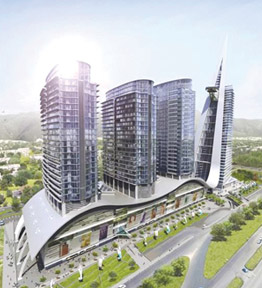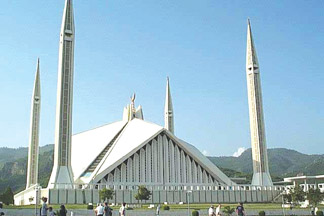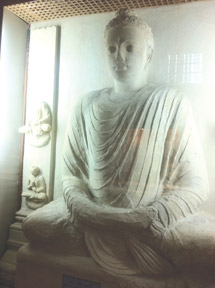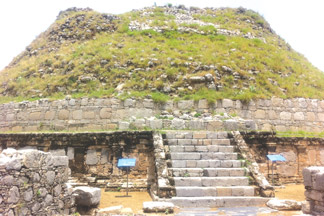Situation in Pakistan, contrary to what is being projected
By Dinesh WEERAWANSA after tour of Pakistan
When I was planning to make an official visit to Pakistan, many
advised me not to undertake such risky assignments. Even some of my
close friends went to the extent of telling me on the eve of my
departure that they may be seeing me alive for the last time.
|

Islamabad, the capital city of Pakistan |
But I knew exactly where I was going and the assumption that the
security situation in Pakistan could not be as bad as what most of us
gather through the media, mainly through television.
My eight-day stay in Pakistan, touring all major cities from the
harbour city of Karachi to the capital city of Islamabad and then to the
historic city of Lahore and Rawalpindi enabled me to get the correct
picture. It was different to what most of us hear and see over
international television and radio channels.
It is true that there are isolated incidents here and there, but most
of the terror attacks are confined only to a few areas. That is far from
what the world media, mainly the pro-Western, media has been projecting.
A small bomb explosion or a clash between two factions was often blown
out of proportion. Full credit should go to those experts in the Western
media for creating stories out of nothing!. This shows their adeptness
in changing world opinion to suit the political agendas of the West.
Pakistan is undergoing the same unfortunate experience that Sri Lanka
had to face till May, 2009 when terrorism was eradicated and the LTTE
leadership was vanquished by the country's valiant Security Forces. Sri
Lanka had to continue its lone battle against terrorism with the support
of only a handful of friendly countries, including Pakistan.
But, the Western media and a section of the international community
were all out to give a premature death to Sri Lanka's battle against
terrorism.
|

The Grand Mosque |
President Mahinda Rajapaksa did not bow down to international
pressure until the LTTE leadership was vanquished at the Nandikadaal
lagoon on May 18, 2009.
Many Pakistanis, especially influential persons holding responsible
positions, said the success behind Sri Lanka's eradication of terrorism
was President Rajapaksa's strong political leadership. They said
Pakistan too is dreaming of a peaceful environment like the one Sri
Lanka is enjoying at present.
The very same countries and international elements which attempted to
disrupt Sri Lanka's battle against terrorism are now attempting to
disrupt Pakistan. They do not wish to see countries such as Sri Lanka
and Pakistan overcoming terrorism and developing. Fortunately, Sri Lanka
had the far-sighted vision of President Rajapaksa to overcome those
overwhelming odds. We hope Pakistan too would face terrorism bravely and
join Sri Lanka to enjoy the dividends of peace.
Most people whom I met during my stay in Pakistan were curious to
know Sri Lanka's success story in eradicating terrorism. They were
surprised when I told them that we in Sri Lanka enjoy peace and freedom
to the maximum and even demolish parapet walls around police stations to
beautify the city. They are keeping their fingers crossed until that day
dawns in the near future for them to enjoy the fruits of peace.
The Western media has been basset when it comes to reporting the
developments in Pakistan. Thousands of people are killed as a result of
shooting incidents in the West but even a relatively small shooting
incident in Pakistan is projected as if the entire city is held hostage
by gunmen. Such irresponsible reporting with vested interests projects a
gloomy picture of Pakistan.
|

Buddha statute at Taxilla Museum |
As a result, most tourists are reluctant to visit Pakistan which has
many undiscovered places of tourist importance. Gandhara is one place
with a rich Buddhist heritage. The Taxilla Museum provides enough proof
to enlighten the rich Buddhist culture that existed in the area in
ancient times. Buddhist tourism could well be promoted through places
such as Gandhara.
But the frightful picture, projected by the Western media, makes sure
that hardly any tourists picks Pakistan as their holiday destination.
This too is similar to the hard times Sri Lanka's tourist industry
underwent a few years ago. Heavily guarded five-star hotels hardly
attract Western tourists due to travel advisories, many of them without
evaluating the true ground situation in Pakistan. Even during Sri
Lanka's battle against terror, many countries in the West issued similar
warnings even though the confrontations were mainly confined to the
North and the East.
Pakistan is one of Sri Lanka's trusted neighbours and the two
countries look forward to further strengthening bilateral relations.
|

Dharmarajika stupa |
Pakistan's Prime Minister Syed Yusuf Raza Gilani also expressed a
similar view at a meeting with External Affairs Minister Prof. G.L.
Peiris in Islamabad.
The Pakistani Premier has also expressed satisfaction at the resolve
of both Pakistan and India to continue with bilateral dialogue, and not
be deterred by terrorists designs to derail the dialogue again. He has
encouraged Sri Lanka to move forward on negotiations with Pakistan on
the Comprehensive Economic Partnership Agreement (CEPA) and welcomed a
meeting in this context between the two countries in Colombo next month.
As he had stated during the meeting with Prof. Peiris, Pakistan is
keen to maintain friendly relations with all its neighbours including
India, Iran and Afghanistan. The stability in Afghanistan is an
important factor for Pakistan which supports an Afghan-led and
Afghan-owned process of reconciliation in their country. He also said
that President Rajapaksa's scheduled tour of Pakistan in November would
contribute to strengthen bilateral relationship between the two
countries.
Sri Lanka could well understand the present plight of Pakistan as we
too suffered immensely due to terrorism. Sri Lanka, with its vast
experience and proven track record in combating terrorism, could well
spearhead a worldwide campaign against terrorism. |

